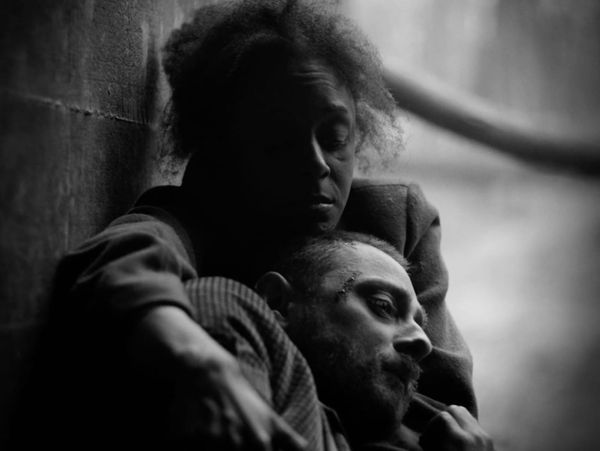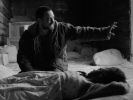Eye For Film >> Movies >> Fugitive Dreams (2020) Film Review
Fugitive Dreams
Reviewed by: Amber Wilkinson

If Waiting For Godot's Vladimir and Estragon had a couple of American cousins, they might look a little like Mary (April Matthis) and John (Robbie Tann), the central characters in Fugitive Dreams, which director Jason Neulander and playwright Caridad Svich have taken from stage (where it was named Fugitive Pieces) to screen in a way that gains scope with the transition.
Like Vladimir and Estragon, Mary and John are "tramps" of a sort, homeless and on the road when they encounter one another in a petrol station loo. And though through the course of the movie they will move around a lot more than Beckett's characters, this is as much a psychological journey as it is physical, and one that never loses its sense of humanism and hope.

Mary is on the brink of suicide when she meets John, while he is haunted by a past that often muscles its way in on the present in hallucinatory fashion. They encounter characters who might be considered their own Pozzo and Lucky - fellow wanderers Israfel (Scott Shepherd) and his disabled mother Providence (O-Lan Jones), who utters a high-pitched noise instead of speech.
Those names suggest a religious element and ideas of a path to redemption of sorts resonate through the film. And though the two pairs encounter one another as they jump a train, their journeys will go on to roam into much less physical realms as the here and now blends with memories and imaginings.
Svich's story explores the way that one person's imagination of another's memory and past may be a far cry from reality, along with the way that even someone who has lived through something may be hazier than they realise about actual events. Shot largely in monochrome by Peter Simonite - who has a wealth of assistant cameraman credits that are surely soon to be joined by more praised cinematography ones - but with colour film used to heighten the emotion and surreality at key moments. Despite the good use of open landscape, you can still feel the shape of the play in the scripting, which often plays out in fairly long stretches.
What's lost in terms of movement, however, is certainly gained in the focus on performance. Matthis and Tann bring very different sorts of fragility to their roles - hers deeply buried, his near the surface - while Shepherd has an easiness that hovers just on the edge of menace, so that his character retains his ambiguity - I'm quite surprised that neither lead snagged an award at Fantasia 2020, where the film had its debut but they could easily do as the film travels elsewhere. David Patrick Kelly also puts in a notable performance, bringing a Willem Dafoe-like intensity to the mysterious character of Henri, who John encounters in the forests of his mind.
Through it all, Nathan Hamilton's bluegrass-inflected, atmospheric score speaks to the more mythic elements of the film and marks him out as another name to look out for in future.
Reviewed on: 04 Sep 2020
















